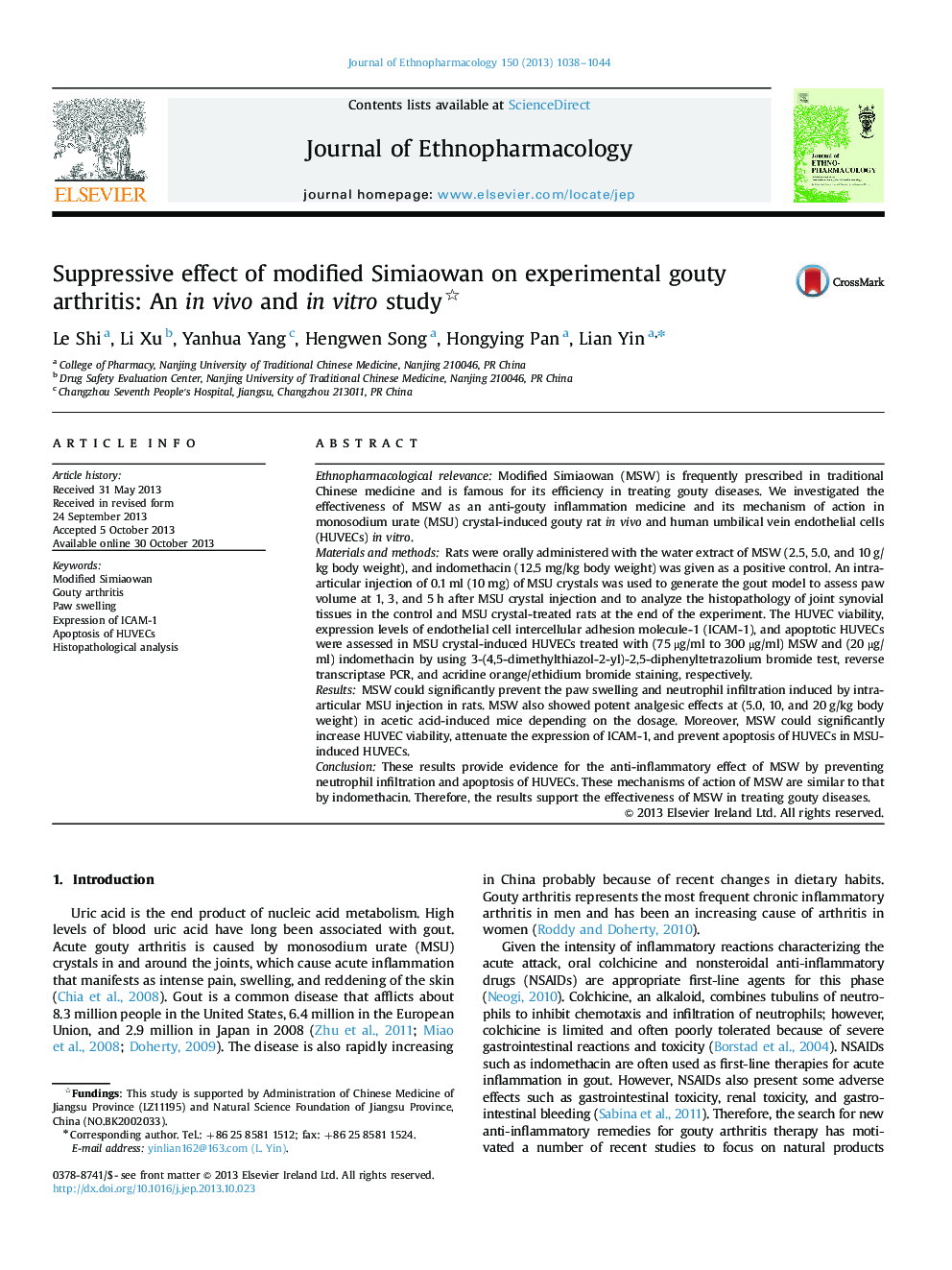| Article ID | Journal | Published Year | Pages | File Type |
|---|---|---|---|---|
| 2545345 | Journal of Ethnopharmacology | 2013 | 7 Pages |
Ethnopharmacological relevanceModified Simiaowan (MSW) is frequently prescribed in traditional Chinese medicine and is famous for its efficiency in treating gouty diseases. We investigated the effectiveness of MSW as an anti-gouty inflammation medicine and its mechanism of action in monosodium urate (MSU) crystal-induced gouty rat in vivo and human umbilical vein endothelial cells (HUVECs) in vitro.Materials and methodsRats were orally administered with the water extract of MSW (2.5, 5.0, and 10 g/kg body weight), and indomethacin (12.5 mg/kg body weight) was given as a positive control. An intra-articular injection of 0.1 ml (10 mg) of MSU crystals was used to generate the gout model to assess paw volume at 1, 3, and 5 h after MSU crystal injection and to analyze the histopathology of joint synovial tissues in the control and MSU crystal-treated rats at the end of the experiment. The HUVEC viability, expression levels of endothelial cell intercellular adhesion molecule-1 (ICAM-1), and apoptotic HUVECs were assessed in MSU crystal-induced HUVECs treated with (75 μg/ml to 300 μg/ml) MSW and (20 μg/ml) indomethacin by using 3-(4,5-dimethylthiazol-2-yl)-2,5-diphenyltetrazolium bromide test, reverse transcriptase PCR, and acridine orange/ethidium bromide staining, respectively.ResultsMSW could significantly prevent the paw swelling and neutrophil infiltration induced by intra-articular MSU injection in rats. MSW also showed potent analgesic effects at (5.0, 10, and 20 g/kg body weight) in acetic acid-induced mice depending on the dosage. Moreover, MSW could significantly increase HUVEC viability, attenuate the expression of ICAM-1, and prevent apoptosis of HUVECs in MSU-induced HUVECs.ConclusionThese results provide evidence for the anti-inflammatory effect of MSW by preventing neutrophil infiltration and apoptosis of HUVECs. These mechanisms of action of MSW are similar to that by indomethacin. Therefore, the results support the effectiveness of MSW in treating gouty diseases.
Graphical abstractThe objective of this study is to investigate the effectiveness of MSW as an anti-gouty inflammation medicine and its mechanism of action in monosodium urate (MSU) crystal-induced gouty rat in vivo and human umbilical vein endothelial cells (HUVECs) in vitro. The results showed that MSW had significant anti-inflammatory action in MSU-induced rats and potent analgesic effects in acetic acid-induced mice. Moreover, MSW could significantly protect HUVECs in MSU-induced HUVECs. These results provide evidence for the anti-inflammatory effect of MSW by preventing neutrophil infiltration and apoptosis of HUVECs. These mechanisms of action of MSW are similar to that by indomethacin. Therefore, the results support the effectiveness of MSW in treating gouty diseases.Figure optionsDownload full-size imageDownload high-quality image (112 K)Download as PowerPoint slide
